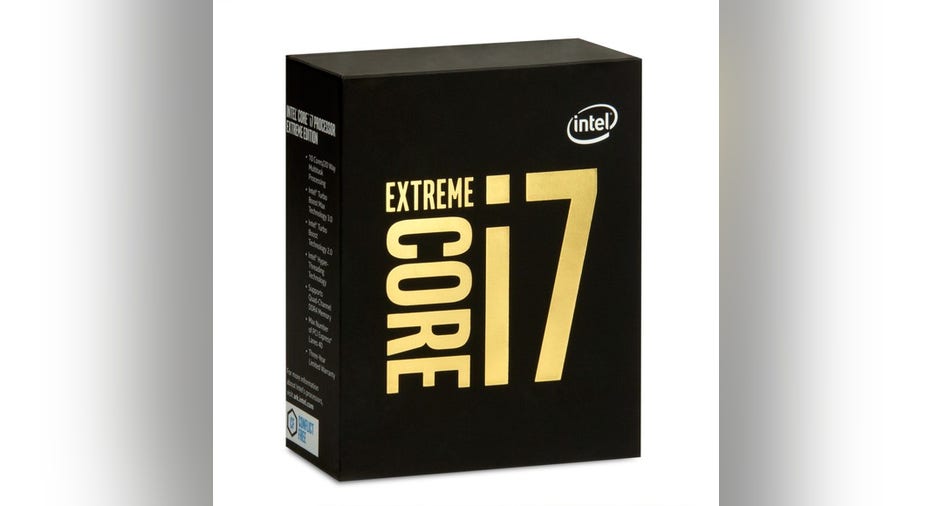Intel Corporation's Best Product of 2016

Microprocessor giant Intel (NASDAQ: INTC) operates in many different product segments, spanning personal computers to data centers to different types of Internet of Things devices. And within those segments, the company builds several products to serve a range of customer demands.
That's why it can be quite difficult to single out an Intel product line -- generally a processor or family of processors -- as being the company's "best" release each year. However, within the company's broad portfolio of products, there are clearly those that are much more important to its financial results today and its prospects tomorrow.
Of all the product families that Intel launched in 2016, there was one that was noteworthy -- the 10-core Core i7 6950X Extreme Edition processor.
A $1,723 processor for gamers and enthusiasts
The Core i7 6950X chip arrived as part of a family of processors commonly referred to by their code name, Broadwell-E. The Broadwell-E family of chips is targeted at what Intel refers to as the high-end desktop market, which consists of gamers and other personal-computer users who want as much processor power as they can get.
Image source: Intel.
Intel priced this chip at an eye-popping $1,723, making it one of the most expensive consumer-grade processors the company has released in recent years. Looking back to 1997, Intel's 300MHz Pentium II processor was priced at $1,981 -- or just shy of $3,000 today, adjusted for inflation.
The launch of this chip, particularly at its price point, smacked of putting out a "feeler" for whether there would be much of a market for such an expensive consumer-grade chip. Going by comments from CEO Brian Krzanich in July, sales of the 10-core chip in the months following its launch were "much better than what even [Intel] anticipated." So it would appear that there is, indeed, real demand for such a processor.
Why this product was so important
It's hard to imagine that the revenue impact from this single product would be enough to move the needle for a behemoth like Intel. Even at very high average selling prices and probably excellent margins, the absolute volumes are just too low to have a big impact.
Nevertheless, the success of this product relative to Intel's expectations probably has the company seriously considering putting more effort into building high-end products specifically tailored for gamers and other personal-computer enthusiasts. For some context, Intel has made it clear that its sales of gaming and enthusiast-related processors continue to enjoy "double-digit" percentage year-over-year growth rates.
By focusing on this market more, the company might be able to accelerate unit growth there through even better products -- as well as revenue and average selling prices -- by introducing even higher-end processors within a given gaming-focused product line.
Runner-up? Knights Landing
A very close second to the Core i7 6950X Extreme Edition gaming chip was Intel's second-generation of Xeon Phi processors, commonly referred to by their code name, Knights Landing. These chips were targeted at high-performance computing and deep-learning applications.
Intel's prior-generation Xeon Phi processors saw some traction in the marketplace, but the second generation of products launched early in 2016 look much more competitive. That hypothesis is seemingly verified by the fact that Krzanich told investors back in July that during the first half of 2016, shipments of its second-generation Xeon Phi processors were up eight times relative to the total number of first-generation Xeon Phi chips that Intel sold during the full year of 2015.
But just like the Core i7 6950X Extreme Edition, robust sales of the second-generation Xeon Phi processors won't dramatically move the needle for Intel, as the revenue base from which sales growth is occurring is quite low. However, that early success should give the company more confidence to invest in future iterations of the product line.
A secret billion-dollar stock opportunity The world's biggest tech company forgot to show you something, but a few Wall Street analysts and the Fool didn't miss a beat: There's a small company that's powering their brand-new gadgets and the coming revolution in technology. And we think its stock price has nearly unlimited room to run for early in-the-know investors! To be one of them, just click here.
Ashraf Eassa owns shares of Intel. The Motley Fool recommends Intel. Try any of our Foolish newsletter services free for 30 days. We Fools may not all hold the same opinions, but we all believe that considering a diverse range of insights makes us better investors. The Motley Fool has a disclosure policy.



















